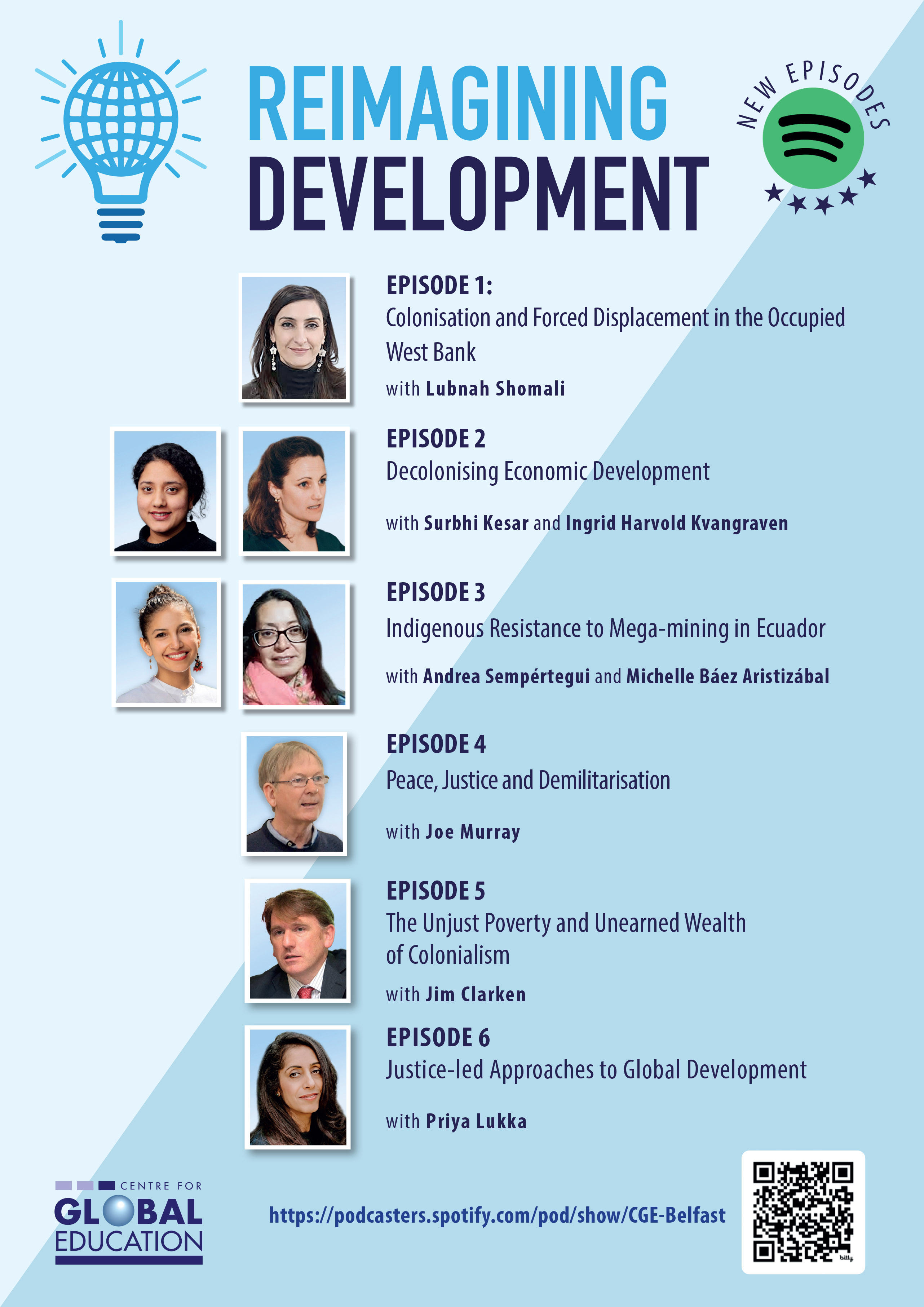Reimagining Development
1. Colonisation and Forced Displacement in the Occupied West Bank with Lubnah Shomali
Lubnah Shomali is Advocacy Manager with BADIL, a Resource Center for Palestinian Residency and Refugee Rights in the occupied West Bank. She discusses the acceleration of Israel’s forcible displacement and transfer of Palestinians in the West Bank since 7 October 2023. She also reflects on the mass incarceration and torture of Palestinians and the importance of language in documenting human rights abuses committed in the context of settler-colonialism.
https://spotifycreators-web.app.link/e/cScTQg5bFSb
2. Decolonising Economic Development with Surbhi Kesar and Ingrid Harvold Kvangraven
Ingrid Harvold Kvangraven is a Senior Lecturer in International Development at King’s College, London and Surbhi Kesar is a senior lecturer in the Department of Economics at SOAS University of London. They are the co-authors of a research report titled Decolonising Economic Development: The Role of the Development Sector which was published by Bond, the British network for organisations working in international development. The report asks to what extent International NGOs support resistance to a colonial or neo-colonial order, or continue to be dominated by a Eurocentric view of economic development? This episode discusses the report and its implications for the international development sector.
https://spotifycreators-web.app.link/e/b9MWYf5bFSb
3. Indigenous Resistance to Mega-mining in Ecuador with Andrea Sempértegui and Michelle Báez Aristizábal
Andrea Sempértegui is a professor of Politics at Whitman College, Washington State, and Michelle Báez Aristizábal is a professor at the Pontifical Catholic University of Ecuador. They are both academics and activists who have carried out research on Indigenous resistance to a mega-mining project called Mirador in Ecuador’s southern Amazon. This episode discusses the environmental cost of the mining project and how it has impacted Indigenous communities and their relationship with land. Andrea and Michelle also discuss their membership of an anti-extractive collective in Ecuador called Comunalisis.
https://spotifycreators-web.app.link/e/I1XR9e5bFSb
4. Peace, Justice and Demilitarisation with Joe Murray
Joe Murray has recently stepped down as Director of the Irish NGO Action from Ireland (AFRI), having worked in the international development sector in Ireland since the 1980s. He reflects on his career as an educator, activist and campaigner for social justice, peace and sustainability. In a dangerous period of military escalation around the world, Joe calls for demilitarisation and cautions against Ireland’s deepening involvement in the arms trade. He also calls for the development education sector in Ireland to more directly engage with the crises impacting our world at present and to keep their practice ‘real’.
https://spotifycreators-web.app.link/e/frzvQozcFSb
5. The Unjust Poverty and Unearned Wealth of Colonialism with Jim Clarken
Jim Clarken is the CEO of Oxfam Ireland and an Executive Director of Oxfam International. He is a leading commentator on human rights, inequality, sustainable development, the rights of refugees and migrants, and business and human rights. In this episode, he discusses the findings of Oxfam’s 2025 global inequality report titled “Takers Not Makers: The Unjust Poverty and Unearned Wealth of Colonialism”. The headline statistic in the report is that billionaire wealth grew by $2 trillion in 2024, equivalent to roughly $5.7 billion a day, while the number of people living in poverty has barely changed since 1990. He discusses the economic system that is driving this inequality and how it can be reformed.
https://spotifycreators-web.app.link/e/23nDvUY7ISb
6. Justice-led Approaches to Global Development with Priya Lukka
Priya Lukka is a doctorate candidate in the School of Politics and International Relations in the University of Leeds. She recently delivered a workshop to members of Bond, the British network of network for organisations working in international development, on a “harm-repair approach” to global justice that acknowledges historic wrongs and how they can be accounted for. This episode discusses her approach to structural power relations, the factors that perpetuate the exclusion of people and the idea of reparations.
https://spotifycreators-web.app.link/e/K7r334XcFSb






